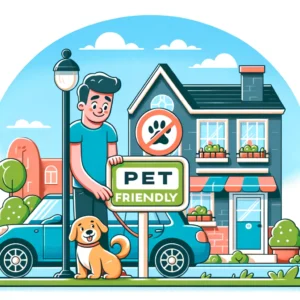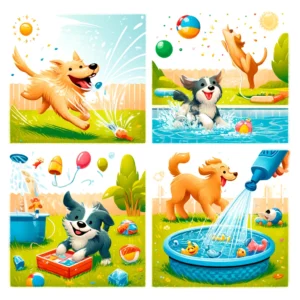Here’s What Every Pet Owner Needs to Know
Understanding Your Pet’s Needs
Being a pet owner is a rewarding experience, but it also comes with great responsibility. Understanding your pet’s needs is crucial for ensuring their happiness and well-being. Whether you have a playful pup, a curious cat, or a chirpy bird, each pet has unique requirements that must be met for them to thrive.
One of the most fundamental aspects of pet care is providing a balanced diet. Just like humans, pets require a nutritious and well-rounded diet to stay healthy. Consult with a veterinarian to determine the best food options for your pet based on their age, breed, and any specific health considerations.
Regular exercise is another essential component of pet care. Dogs need daily walks and playtime, while cats benefit from interactive toys and climbing structures. Even small pets like rabbits and guinea pigs need opportunities for physical activity. Engaging your pet in regular exercise not only keeps them physically fit but also provides mental stimulation.
Creating a Safe and Stimulating Environment
Creating a safe and stimulating environment is vital for a pet’s well-being. Ensure that your home is pet-proofed, removing any potential hazards such as toxic plants, small objects that could be swallowed, or accessible electrical cords. Providing a designated space for your pet, whether it’s a cozy bed for a dog or a climbing tree for a cat, gives them a sense of security and belonging.
Enrichment activities are also important for preventing boredom and behavioral issues. Puzzle feeders, interactive toys, and regular training sessions can keep your pet mentally engaged. For cats, consider creating vertical spaces for climbing and perching, as well as hiding spots for them to explore. Dogs benefit from a variety of toys that cater to their natural chewing and foraging instincts.
Regular veterinary check-ups are non-negotiable when it comes to pet care. Just like humans, pets need routine medical attention to monitor their health and address any potential issues. Stay up to date with vaccinations, parasite prevention, and dental care to ensure your pet stays in optimal condition.
Building a Strong Bond
Building a strong bond with your pet is one of the most fulfilling aspects of pet ownership. Spend quality time with your pet, whether it’s through grooming sessions, training exercises, or simply relaxing together. Understanding your pet’s body language and vocalizations can help strengthen your bond and enhance communication.
Consistency and positive reinforcement are key elements of training and behavior management. Use rewards and praise to encourage good behavior, and be patient and understanding when addressing any challenges. Remember that building a strong bond with your pet takes time and effort, but the rewards are immeasurable.
Lastly, never underestimate the power of love and affection. Pets thrive on companionship and affectionate interactions. Whether it’s a gentle pat on the head, a cozy cuddle on the couch, or a fun play session, expressing your love for your pet strengthens the bond between you.
As a pet owner, your role is to provide love, care, and support for your furry, feathered, or scaly companion. By understanding their needs, creating a safe environment, and nurturing a strong bond, you can ensure that your pet lives a happy and fulfilling life as a cherished member of your family.
Fostering a Strong Bond with Your Pet
Developing a strong bond with your pet is not only rewarding for you but also crucial for their emotional well-being. Pets thrive on attention, affection, and quality time with their human companions. Take the time to engage in interactive play, cuddle sessions, and positive reinforcement training to strengthen the connection between you and your furry, feathered, or scaly friend.
One of the best ways to build a bond with your pet is through positive reinforcement training. This method focuses on rewarding desired behaviors, rather than punishing undesirable ones. Not only does this create a more positive learning environment, but it also helps to establish trust and cooperation between you and your pet. Whether you’re teaching your dog to sit, your cat to come when called, or your bird to step up onto your finger, the rewards of successful training are well worth the effort.
In addition to training, simple acts of affection, such as petting, brushing, and cuddling, can go a long way in strengthening the bond with your pet. Cats, for example, often enjoy a good grooming session, while dogs may relish a cozy snuggle on the couch. Paying attention to your pet’s individual preferences and responding accordingly can help create a deep, lasting connection.
Adapting to Life Changes with Your Pet
Life is full of changes, and it’s essential to ensure that your pet can navigate these transitions with ease. Whether it’s moving to a new home, introducing a new family member, or adjusting to a change in routine, being mindful of your pet’s needs can make all the difference.
When moving to a new home, take the time to carefully introduce your pet to their new surroundings. Provide familiar items, such as their bedding or toys, to help them feel more at ease. Gradually expose them to new sights, sounds, and smells, allowing them to explore at their own pace. This gradual acclimation can help reduce stress and anxiety during the transition.
Introducing a new family member, whether it’s a human baby or another pet, can be a delicate process. Proper introductions and a patient, positive approach are crucial. Take the time to familiarize your pet with the new arrival, and never force interactions. Provide your pet with their own space and routines to help them adjust to the changes. With time and understanding, your pet can learn to embrace the new addition to the family.
Changes in routine, such as a new work schedule or a family member leaving for an extended period, can also be challenging for pets. Maintain consistent feeding times, exercise routines, and playtime to help your pet feel secure. Consider hiring a pet sitter or asking a trusted friend or family member to check in on your pet during times of transition to ensure their needs are met.
Addressing Common Pet Behavior Challenges
Even the most well-cared-for pets can sometimes exhibit challenging behaviors. Understanding the root causes of these behaviors and addressing them proactively is key to maintaining a harmonious household.
One of the most common behavior issues in pets is excessive barking or meowing. This could be a sign of boredom, anxiety, or a need for more attention and stimulation. Provide your pet with plenty of toys, mental exercises, and one-on-one playtime to help alleviate this behavior. If the problem persists, consider consulting a professional trainer or animal behaviorist for personalized guidance.
Destructive behaviors, such as chewing, scratching, or digging, are often a result of pent-up energy or a lack of appropriate outlets. Ensure your pet has access to suitable toys and designated areas for these natural behaviors. For example, provide a scratching post for cats or a digging box for dogs. Redirecting their energy to approved activities can help curb destructive tendencies.
Separation anxiety is another common challenge, particularly in dogs, that can manifest in behaviors like excessive whining, barking, or even destructive acts. Gradual desensitization training, providing interactive toys or puzzles, and leaving behind comforting items can help ease your pet’s anxiety when you’re away.
It’s important to remember that every pet is unique, and what works for one may not work for another. Patience, consistency, and a willingness to try different approaches are key to addressing behavioral issues successfully.
Embracing the Joys of Pet Ownership
Beyond the responsibilities and challenges of pet ownership, the joys and benefits of sharing your life with a furry, feathered, or scaly companion are truly remarkable. Pets have a unique ability to bring happiness, laughter, and unconditional love into our lives, and the rewards of pet ownership are well worth the effort.
One of the most significant benefits of pet ownership is the positive impact on mental health. Studies have shown that interacting with pets can reduce stress, anxiety, and depression, while also increasing feelings of social connectedness and overall well-being. Spending time with your pet, whether it’s going for a walk, playing a game, or simply cuddling on the couch, can provide a much-needed respite from the demands of daily life.
Pets can also encourage a more active lifestyle, as caring for them often requires regular exercise and outdoor activities. Dog owners, for example, tend to be more physically active, leading to improved cardiovascular health and overall fitness. Even smaller pets, such as rabbits or guinea pigs, can benefit from daily playtime and exploration, which can keep their owners active and engaged.
The companionship and unconditional love that pets provide are truly priceless. Whether it’s a wagging tail, a gentle purr, or a gentle nuzzle, the emotional support and affection of a pet can be a profound source of comfort and joy. Pets have a unique way of sensing our moods and responding with empathy, making them invaluable companions during both good and difficult times.
Embracing the joys of pet ownership is about more than just meeting their basic needs – it’s about cherishing the unique bond and enriching experiences that come with sharing your life with a beloved animal companion. By recognizing and celebrating the many benefits of pet ownership, we can ensure that our pets receive the love, care, and attention they deserve.
Understanding Your Pet’s Needs
Being a pet owner is a rewarding experience, but it also comes with great responsibility. Understanding your pet’s needs is crucial for ensuring their happiness and well-being. Whether you have a playful pup, a curious cat, or a chirpy bird, each pet has unique requirements that must be met for them to thrive.
One of the most fundamental aspects of pet care is providing a balanced diet. Just like humans, pets require a nutritious and well-rounded diet to stay healthy. Consult with a veterinarian to determine the best food options for your pet based on their age, breed, and any specific health considerations.
Regular exercise is another essential component of pet care. Dogs need daily walks and playtime, while cats benefit from interactive toys and climbing structures. Even small pets like rabbits and guinea pigs need opportunities for physical activity. Engaging your pet in regular exercise not only keeps them physically fit but also provides mental stimulation.
Creating a Safe and Stimulating Environment
Creating a safe and stimulating environment is vital for a pet’s well-being. Ensure that your home is pet-proofed, removing any potential hazards such as toxic plants, small objects that could be swallowed, or accessible electrical cords. Providing a designated space for your pet, whether it’s a cozy bed for a dog or a climbing tree for a cat, gives them a sense of security and belonging.
Enrichment activities are also important for preventing boredom and behavioral issues. Puzzle feeders, interactive toys, and regular training sessions can keep your pet mentally engaged. For cats, consider creating vertical spaces for climbing and perching, as well as hiding spots for them to explore. Dogs benefit from a variety of toys that cater to their natural chewing and foraging instincts.
Regular veterinary check-ups are non-negotiable when it comes to pet care. Just like humans, pets need routine medical attention to monitor their health and address any potential issues. Stay up to date with vaccinations, parasite prevention, and dental care to ensure your pet stays in optimal condition.
Building a Strong Bond
Building a strong bond with your pet is one of the most fulfilling aspects of pet ownership. Spend quality time with your pet, whether it’s through grooming sessions, training exercises, or simply relaxing together. Understanding your pet’s body language and vocalizations can help strengthen your bond and enhance communication.
Consistency and positive reinforcement are key elements of training and behavior management. Use rewards and praise to encourage good behavior, and be patient and understanding when addressing any challenges. Remember that building a strong bond with your pet takes time and effort, but the rewards are immeasurable.
Lastly, never underestimate the power of love and affection. Pets thrive on companionship and affectionate interactions. Whether it’s a gentle pat on the head, a cozy cuddle on the couch, or a fun play session, expressing your love for your pet strengthens the bond between you.
As a pet owner, your role is to provide love, care, and support for your furry, feathered, or scaly companion. By understanding their needs, creating a safe environment, and nurturing a strong bond, you can ensure that your pet lives a happy and fulfilling life as a cherished member of your family.
Fostering a Strong Bond with Your Pet
Developing a strong bond with your pet is not only rewarding for you but also crucial for their emotional well-being. Pets thrive on attention, affection, and quality time with their human companions. Take the time to engage in interactive play, cuddle sessions, and positive reinforcement training to strengthen the connection between you and your furry, feathered, or scaly friend.
One of the best ways to build a bond with your pet is through positive reinforcement training. This method focuses on rewarding desired behaviors, rather than punishing undesirable ones. Not only does this create a more positive learning environment, but it also helps to establish trust and cooperation between you and your pet. Whether you’re teaching your dog to sit, your cat to come when called, or your bird to step up onto your finger, the rewards of successful training are well worth the effort.
In addition to training, simple acts of affection, such as petting, brushing, and cuddling, can go a long way in strengthening the bond with your pet. Cats, for example, often enjoy a good grooming session, while dogs may relish a cozy snuggle on the couch. Paying attention to your pet’s individual preferences and responding accordingly can help create a deep, lasting connection.
Adapting to Life Changes with Your Pet
Life is full of changes, and it’s essential to ensure that your pet can navigate these transitions with ease. Whether it’s moving to a new home, introducing a new family member, or adjusting to a change in routine, being mindful of your pet’s needs can make all the difference.
When moving to a new home, take the time to carefully introduce your pet to their new surroundings. Provide familiar items, such as their bedding or toys, to help them feel more at ease. Gradually expose them to new sights, sounds, and smells, allowing them to explore at their own pace. This gradual acclimation can help reduce stress and anxiety during the transition.
Introducing a new family member, whether it’s a human baby or another pet, can be a delicate process. Proper introductions and a patient, positive approach are crucial. Take the time to familiarize your pet with the new arrival, and never force interactions. Provide your pet with their own space and routines to help them adjust to the changes. With time and understanding, your pet can learn to embrace the new addition to the family.
Changes in routine, such as a new work schedule or a family member leaving for an extended period, can also be challenging for pets. Maintain consistent feeding times, exercise routines, and playtime to help your pet feel secure. Consider hiring a pet sitter or asking a trusted friend or family member to check in on your pet during times of transition to ensure their needs are met.
Addressing Common Pet Behavior Challenges
Even the most well-cared-for pets can sometimes exhibit challenging behaviors. Understanding the root causes of these behaviors and addressing them proactively is key to maintaining a harmonious household.
One of the most common behavior issues in pets is excessive barking or meowing. This could be a sign of boredom, anxiety, or a need for more attention and stimulation. Provide your pet with plenty of toys, mental exercises, and one-on-one playtime to help alleviate this behavior. If the problem persists, consider consulting a professional trainer or animal behaviorist for personalized guidance.
Destructive behaviors, such as chewing, scratching, or digging, are often a result of pent-up energy or a lack of appropriate outlets. Ensure your pet has access to suitable toys and designated areas for these natural behaviors. For example, provide a scratching post for cats or a digging box for dogs. Redirecting their energy to approved activities can help curb destructive tendencies.
Separation anxiety is another common challenge, particularly in dogs, that can manifest in behaviors like excessive whining, barking, or even destructive acts. Gradual desensitization training, providing interactive toys or puzzles, and leaving behind comforting items can help ease your pet’s anxiety when you’re away.
It’s important to remember that every pet is unique, and what works for one may not work for another. Patience, consistency, and a willingness to try different approaches are key to addressing behavioral issues successfully.
Embracing the Joys of Pet Ownership
Beyond the responsibilities and challenges of pet ownership, the joys and benefits of sharing your life with a furry, feathered, or scaly companion are truly remarkable. Pets have a unique ability to bring happiness, laughter, and unconditional love into our lives, and the rewards of pet ownership are well worth the effort.
One of the most significant benefits of pet ownership is the positive impact on mental health. Studies have shown that interacting with pets can reduce stress, anxiety, and depression, while also increasing feelings of social connectedness and overall well-being. Spending time with your pet, whether it’s going for a walk, playing a game, or simply cuddling on the couch, can provide a much-needed respite from the demands of daily life.
Pets can also encourage a more active lifestyle, as caring for them often requires regular exercise and outdoor activities. Dog owners, for example, tend to be more physically active, leading to improved cardiovascular health and overall fitness. Even smaller pets, such as rabbits or guinea pigs, can benefit from daily playtime and exploration, which can keep their owners active and engaged.
The companionship and unconditional love that pets provide are truly priceless. Whether it’s a wagging tail, a gentle purr, or a gentle nuzzle, the emotional support and affection of a pet can be a profound source of comfort and joy. Pets have a unique way of sensing our moods and responding with empathy, making them invaluable companions during both good and difficult times.
Embracing the joys of pet ownership is about more than just meeting their basic needs – it’s about cherishing the unique bond and enriching experiences that come with sharing your life with a beloved animal companion. By recognizing and celebrating the many benefits of pet ownership, we can ensure that our pets receive the love, care, and attention they deserve.
Understanding Your Pet’s Needs
Being a pet owner is a rewarding experience, but it also comes with great responsibility. Understanding your pet’s needs is crucial for ensuring their happiness and well-being. Whether you have a playful pup, a curious cat, or a chirpy bird, each pet has unique requirements that must be met for them to thrive.
One of the most fundamental aspects of pet care is providing a balanced diet. Just like humans, pets require a nutritious and well-rounded diet to stay healthy. Consult with a veterinarian to determine the best food options for your pet based on their age, breed, and any specific health considerations.
Regular exercise is another essential component of pet care. Dogs need daily walks and playtime, while cats benefit from interactive toys and climbing structures. Even small pets like rabbits and guinea pigs need opportunities for physical activity. Engaging your pet in regular exercise not only keeps them physically fit but also provides mental stimulation.
Creating a Safe and Stimulating Environment
Creating a safe and stimulating environment is vital for a pet’s well-being. Ensure that your home is pet-proofed, removing any potential hazards such as toxic plants, small objects that could be swallowed, or accessible electrical cords. Providing a designated space for your pet, whether it’s a cozy bed for a dog or a climbing tree for a cat, gives them a sense of security and belonging.
Enrichment activities are also important for preventing boredom and behavioral issues. Puzzle feeders, interactive toys, and regular training sessions can keep your pet mentally engaged. For cats, consider creating vertical spaces for climbing and perching, as well as hiding spots for them to explore. Dogs benefit from a variety of toys that cater to their natural chewing and foraging instincts.
Regular veterinary check-ups are non-negotiable when it comes to pet care. Just like humans, pets need routine medical attention to monitor their health and address any potential issues. Stay up to date with vaccinations, parasite prevention, and dental care to ensure your pet stays in optimal condition.
Building a Strong Bond
Building a strong bond with your pet is one of the most fulfilling aspects of pet ownership. Spend quality time with your pet, whether it’s through grooming sessions, training exercises, or simply relaxing together. Understanding your pet’s body language and vocalizations can help strengthen your bond and enhance communication.
Consistency and positive reinforcement are key elements of training and behavior management. Use rewards and praise to encourage good behavior, and be patient and understanding when addressing any challenges. Remember that building a strong bond with your pet takes time and effort, but the rewards are immeasurable.
Lastly, never underestimate the power of love and affection. Pets thrive on companionship and affectionate interactions. Whether it’s a gentle pat on the head, a cozy cuddle on the couch, or a fun play session, expressing your love for your pet strengthens the bond between you.
As a pet owner, your role is to provide love, care, and support for your furry, feathered, or scaly companion. By understanding their needs, creating a safe environment, and nurturing a strong bond, you can ensure that your pet lives a happy and fulfilling life as a cherished member of your family.
Fostering a Strong Bond with Your Pet
Developing a strong bond with your pet is not only rewarding for you but also crucial for their emotional well-being. Pets thrive on attention, affection, and quality time with their human companions. Take the time to engage in interactive play, cuddle sessions, and positive reinforcement training to strengthen the connection between you and your furry, feathered, or scaly friend.
One of the best ways to build a bond with your pet is through positive reinforcement training. This method focuses on rewarding desired behaviors, rather than punishing undesirable ones. Not only does this create a more positive learning environment, but it also helps to establish trust and cooperation between you and your pet. Whether you’re teaching your dog to sit, your cat to come when called, or your bird to step up onto your finger, the rewards of successful training are well worth the effort.
In addition to training, simple acts of affection, such as petting, brushing, and cuddling, can go a long way in strengthening the bond with your pet. Cats, for example, often enjoy a good grooming session, while dogs may relish a cozy snuggle on the couch. Paying attention to your pet’s individual preferences and responding accordingly can help create a deep, lasting connection.
Adapting to Life Changes with Your Pet
Life is full of changes, and it’s essential to ensure that your pet can navigate these transitions with ease. Whether it’s moving to a new home, introducing a new family member, or adjusting to a change in routine, being mindful of your pet’s needs can make all the difference.
When moving to a new home, take the time to carefully introduce your pet to their new surroundings. Provide familiar items, such as their bedding or toys, to help them feel more at ease. Gradually expose them to new sights, sounds, and smells, allowing them to explore at their own pace. This gradual acclimation can help reduce stress and anxiety during the transition.
Introducing a new family member, whether it’s a human baby or another pet, can be a delicate process. Proper introductions and a patient, positive approach are crucial. Take the time to familiarize your pet with the new arrival, and never force interactions. Provide your pet with their own space and routines to help them adjust to the changes. With time and understanding, your pet can learn to embrace the new addition to the family.
Changes in routine, such as a new work schedule or a family member leaving for an extended period, can also be challenging for pets. Maintain consistent feeding times, exercise routines, and playtime to help your pet feel secure. Consider hiring a pet sitter or asking a trusted friend or family member to check in on your pet during times of transition to ensure their needs are met.
Addressing Common Pet Behavior Challenges
Even the most well-cared-for pets can sometimes exhibit challenging behaviors. Understanding the root causes of these behaviors and addressing them proactively is key to maintaining a harmonious household.
One of the most common behavior issues in pets is excessive barking or meowing. This could be a sign of boredom, anxiety, or a need for more attention and stimulation. Provide your pet with plenty of toys, mental exercises, and one-on-one playtime to help alleviate this behavior. If the problem persists, consider consulting a professional trainer or animal behaviorist for personalized guidance.
Destructive behaviors, such as chewing, scratching, or digging, are often a result of pent-up energy or a lack of appropriate outlets. Ensure your pet has access to suitable toys and designated areas for these natural behaviors. For example, provide a scratching post for cats or a digging box for dogs. Redirecting their energy to approved activities can help curb destructive tendencies.
Separation anxiety is another common challenge, particularly in dogs, that can manifest in behaviors like excessive whining, barking, or even destructive acts. Gradual desensitization training, providing interactive toys or puzzles, and leaving behind comforting items can help ease your pet’s anxiety when you’re away.
It’s important to remember that every pet is unique, and what works for one may not work for another. Patience, consistency, and a willingness to try different approaches are key to addressing behavioral issues successfully.
Embracing the Joys of Pet Ownership
Beyond the responsibilities and challenges of pet ownership, the joys and benefits of sharing your life with a furry, feathered, or scaly companion are truly remarkable. Pets have a unique ability to bring happiness, laughter, and unconditional love into our lives, and the rewards of pet ownership are well worth the effort.
One of the most significant benefits of pet ownership is the positive impact on mental health. Studies have shown that interacting with pets can reduce stress, anxiety, and depression, while also increasing feelings of social connectedness and overall well-being. Spending time with your pet, whether it’s going for a walk, playing a game, or simply cuddling on the couch, can provide a much-needed respite from the demands of daily life.
Pets can also encourage a more active lifestyle, as caring for them often requires regular exercise and outdoor activities. Dog owners, for example, tend to be more physically active, leading to improved cardiovascular health and overall fitness. Even smaller pets, such as rabbits or guinea pigs, can benefit from daily playtime and exploration, which can keep their owners active and engaged.
The companionship and unconditional love that pets provide are truly priceless. Whether it’s a wagging tail, a gentle purr, or a gentle nuzzle, the emotional support and affection of a pet can be a profound source of comfort and joy. Pets have a unique way of sensing our moods and responding with empathy, making them invaluable companions during both good and difficult times.
Embracing the joys of pet ownership is about more than just meeting their basic needs – it’s about cherishing the unique bond and enriching experiences that come with sharing your life with a beloved animal companion. By recognizing and celebrating the many benefits of pet ownership, we can ensure that our pets receive the love, care, and attention they deserve.









